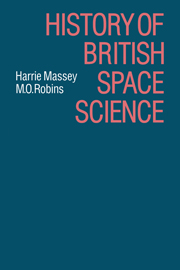Book contents
- Frontmatter
- Contents
- Glossary of abbreviations in text and annexes
- Glossary of abbreviations in appendices
- Preface
- 1 The scientific background
- 2 The technical background
- 3 The initiation of the Skylark rocket programme – the IGY and artificial satellites
- 4 Post-IGY developments – NASA – COSPAR – British National Committee for Space Research – British satellite experiments
- 5 The Ariel programme
- 6 The European Space Research Organization
- 7 Commonwealth co-operation in space reseach
- 8 Smaller rockets for scientific purposes – Skua and Petrel
- 9 Attitude controlled Skylark rockets
- 10 The Trend Committee and the Science Research Council
- 11 The transformation of ESRO into ESA
- 12 The Space Science Committee for Europe
- 13 Scientific studies by British space scientists – figure of the earth and the neutral atmosphere
- 14 Scientific studies by British space scientists – the ionosphere, the magnetosphere and cosmic rays
- 15 The contribution from British space scientists to astronomy
- 16 Concluding remarks
- Appendices
- Annexes
- Notes
- Index
Preface
Published online by Cambridge University Press: 05 February 2012
- Frontmatter
- Contents
- Glossary of abbreviations in text and annexes
- Glossary of abbreviations in appendices
- Preface
- 1 The scientific background
- 2 The technical background
- 3 The initiation of the Skylark rocket programme – the IGY and artificial satellites
- 4 Post-IGY developments – NASA – COSPAR – British National Committee for Space Research – British satellite experiments
- 5 The Ariel programme
- 6 The European Space Research Organization
- 7 Commonwealth co-operation in space reseach
- 8 Smaller rockets for scientific purposes – Skua and Petrel
- 9 Attitude controlled Skylark rockets
- 10 The Trend Committee and the Science Research Council
- 11 The transformation of ESRO into ESA
- 12 The Space Science Committee for Europe
- 13 Scientific studies by British space scientists – figure of the earth and the neutral atmosphere
- 14 Scientific studies by British space scientists – the ionosphere, the magnetosphere and cosmic rays
- 15 The contribution from British space scientists to astronomy
- 16 Concluding remarks
- Appendices
- Annexes
- Notes
- Index
Summary
Space Science in Britain was initiated, and the foundations for its development were laid, very largely by one man, the late Sir Harrie Massey. Sadly, his untimely death in November 1983 occurred before this Preface could be written, but the main text of the History was complete. It bears witness to the enormous contribution which he made through his vision, foresight and determination. With the close co-operation of the late Sir David Martin, then Executive Secretary of the Royal Society, and the late Roger Quirk, then a senior member of the Ministry for Science, Massey as Chairman of the British National Committee on Space Research, took the lead in harnessing the essential components for a British Space Science programme.
The resulting combination of science, mainly from university departments of physics, and technology, mainly from government research establishments, supported by government funds and backed by electronic and aerospace firms in British industry, proved to be very successful and more than able to hold its own with the tightly organized Space Agencies of other countries. Massey always believed that his first duty lay with British Universities, but his vision extended far beyond those boundaries. From the mid-1950s to the end of his life he was tireless in stimulating and encouraging international co-operation in the furtherance of space science. The extensive and highly successful joint programme between Britain and the USA, the genesis and development of the European Space Research Organization, later to become the European Space Agency, the Commonwealth Collaborative Programme and many aspects of the work of COSPAR and of the European Science Foundation, all bear the marks of Massey's genius for leadership in co-operative programmes of science.
- Type
- Chapter
- Information
- History of British Space Science , pp. xix - xxiiPublisher: Cambridge University PressPrint publication year: 1986



